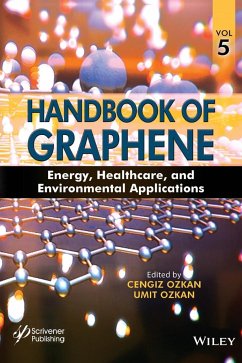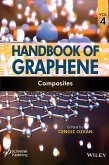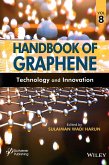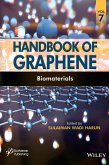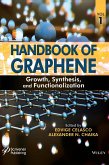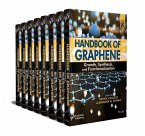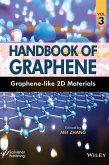This unique multidisciplinary 8-volume set focuses on the emerging issues concerning graphene materials and provides a shared platform for both researcher and industry. The Handbook of Graphene comprises 140 chapters from world renowned experts and presents in a unique eight-volume format covering all aspects relating to graphene--its development, synthesis, application techniques, and integration methods; its modification and functionalization; its characterization tools and related 2D materials; physical, chemical, and biological studies of graphene and related 2D materials; graphene composites; use of graphene in energy, healthcare, and environmental applications (electronics, photonics, spintronics, bioelectronics and optoelectronics, photovoltaics, energy storage, fuel cells and hydrogen storage, and graphene-based devices); its large-scale production and characterization; as well as graphene-related 2D material innovations and their commercialization. Volume 5 is solely focused on selected topics in energy, healthcare and environmental applications and provides an overview of the multitude of different research directions that are currently being taken at the international level. Some of the important topics include but are not limited to: Graphene nanomaterials in energy and environment applications; graphene as nanolubricant for machining; three-dimensional graphene foams for energy storage applications; three-dimensional graphene materials: synthesis and applications in electrocatalysts and electrochemical sensors; graphene and graphene-based hybrid composites for advanced rechargeable battery electrodes; graphene-based materials for advanced lithium ion batteries; graphene based materials for supercapacitors and conductive additives of lithium ion batteries; graphene based flexible actuators, sensors and supercapacitors; graphene as catalyst support for the reactions in fuel cells; nitrogen-doped carbon nanostructures as oxygen reduction reaction (orr) and oxygen evolution reaction (oer) electrocatalysts in acidic media; recent advances in graphene-based materials for photocatalytic h2 evolution; graphene thermal functional device and its property characterization; self- and directed-assembly of metallic and non-metallic fluorophors: considerations into graphene and graphene oxides for sensing and imaging applications; stimuli-responsive graphene based matrices for smart therapeutics; application of graphene materials in molecular diagnostics; graphene-based membranes for liquid separation. Audience This book is intended for researchers and graduate students in the field of advanced materials and graphene in particular, who are currently investigating the fundamental properties of this material and its applications in micro- and nanotechnologies.

